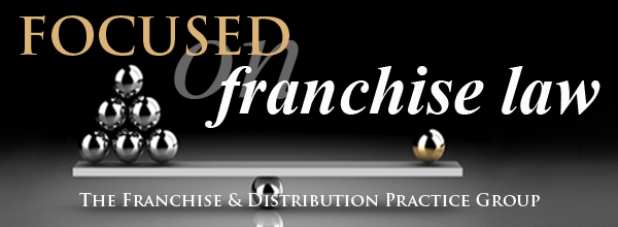Franchise 101: Hilton’s Manual Overload; and Pabst’s Cold Brew Remedy

bkurtz@lewitthackman.com
tgrinblat@lewitthackman.com
msoroky@lewitthackman.com
kwallman@lewitthackman.com
JULY 2017
Barry Kurtz in Los Angeles Daily Journal
“Franchisors will need to adjust their methods when accounting for franchise fees either this year or next, depending on whether the system is publicly owned or not . . .” (Co-written with Christopher L. Passmore, CPA)
Read: New Accounting Rule May Lower Perceived Value of Franchisors
Tal Grinblat in Valley Lawyer
“An applicant that receives an objection claiming that the mark is confusingly similar to another party’s trademark has several options…”
Read: Confusing Trademarks | The Next Course of Action
FRANCHISOR 101: Manual Overload

 A franchisor’s investment in brand standards, protection and control often comes at a cost when a consumer believing or claiming to believe the franchisor and franchisee are the same, seeks to hold a franchisor liable for a franchisee’s conduct.
A franchisor’s investment in brand standards, protection and control often comes at a cost when a consumer believing or claiming to believe the franchisor and franchisee are the same, seeks to hold a franchisor liable for a franchisee’s conduct.
A New Jersey federal court has ruled that hotel franchisor Hilton Worldwide must answer for a guest’s claim that a franchised Hilton hotel failed to stop over $80,000 in unauthorized charges by a disgruntled ex-employee. The ex-employee extended a 5-night stay on the corporate account by several months. The court found Hilton could be vicariously liable for the franchisee’s oversight, based on control it exercised, and reserved, over the franchisee.
A staffing agency (“eTeam”) authorized its employee to stay at the Hilton Garden Inn in San Francisco. The hotel had authorization from eTeam’s headquarters to charge eTeam’s corporate credit account for the employee’s five-night stay. After five days passed, the employee remained at the hotel, charging eTeam’s account, although she no longer worked for the company. The ex-employee’s stay resulted in over $80,000 of unauthorized charges. eTeam sought the money back from Hilton even though it was Hilton’s franchisee that ran the hotel and charged eTeam.
The court looked beyond the franchise agreement’s disclaimer of an agency relationship and focused on the parties’ course of conduct – finding that Hilton had control over the franchisee’s personnel decisions, training of employees and day-to-day operations like room cleaning and food service.
Hilton’s contractual right to control was also significant. The franchise agreement incorporated Hilton’s operations manual. The manual included pre-approval for management hires, and even dictated china, glassware, silverware, and the exact type and number of coffee packets to place in each room. The court found that Hilton had direct control over reservation processing and payment at the franchisee’s location. Finding Hilton’s control over the franchisee’s operations extended far beyond what is necessary to protect the Hilton brand, the court denied Hilton’s request to be dismissed on summary judgment.
When a court is asked to find an agency relationship, a franchisor cannot rely on a disclaimer in the franchise agreement. The existence of an agency relationship is fact-specific.
Franchisors should consider this when reserving strong rights of control and incorporating operation manuals by reference into franchise agreements. The franchisor’s appearance of unnecessary control over personnel, employee training, or franchisee policies can turn the franchisor-franchisee arrangement into a principal-agency relationship subjecting the franchisor to liability.
See: eTeam, Inc. v. Hilton Worldwide Holdings, Inc., D. N.J., 15,988
FRANCHISEE 101: Cold Brew Remedy

Beer distributors can be on common footing with their franchisee counterparts in bargaining with brewers or suppliers. Depending on the jurisdiction, distributors may have protection through beer distribution statutes patterned after relationship statutes adopted in many states to protect franchisees from their franchisors.
A Tacoma, Washington federal court has granted protection to distributors under the Washington Wholesale Supplier and Distributor Act (the “Act”), finding the Act does not authorize a beer supplier to terminate a distributor without cause, and finding that a terminated distributor is not limited to just the remedies in the Act.
Pabst Brewing Co. terminated its agreement with a distributor and arranged for someone else to service the former distributor’s territories. The terminated distributor sued Pabst for its investment and lost profits, claiming the termination lacked cause and failure to give 60 days’ written notice.
Pabst moved to dismiss, arguing that the Act’s only remedy was compensation from the successor distributor for “laid-in cost of inventory” and “fair market value of the terminated distribution rights.”
The court agreed with the terminated distributor, finding that both statutory and common law remedies can coexist. Thus, compensation to the terminated distributor did not have to come only from the successor distributor. The Act’s purpose was not to create immunity for the supplier for its wrongdoing, or to pass off its liabilities to a successor. Pabst’s motion to dismiss was denied.
See: Marine View Beverage, Inc. v. Pabst Brewing Co., LLC, W.D. Wash., 15,984
